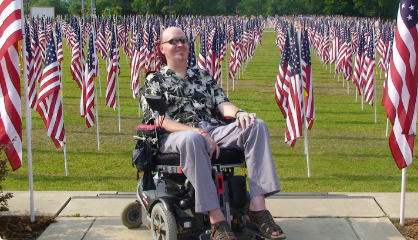Financial Planning
The suddenness of a stroke, spinal cord or brain injury can be devastating emotionally and physically, but also financially.
At first, gaining control of the financial future is difficult for people who may be preoccupied with day-to-day disability issues. While situations vary, there are some basic steps to take to reduce anxiety about paying bills and affording necessary equipment and care down the road.
Get organized and ask for help:
- Talk to your employer about disability benefits
- Locate important financial and legal papers
- Estimate your medical expenses
- Prioritize your bills and keep good records
Consider all sources of funds:
- This includes medical care and equipment, including your health insurance, VA benefits, auto insurance, workers comp, lawsuits, etc.
Keep your current insurance policy in force:
- If you lapse in coverage for two months or more, you could be denied coverage for up to a year in your next group plan.
- COBRA allows for continuation of coverage in some cases: if your employment ends (voluntarily or involuntarily) for reasons other than gross misconduct; or your work hours are reduced to the point you no longer qualify for your employer’s healthcare plan.
It is also important to understand Social Security and federal healthcare benefits, and get to know your rights so you can advocate for them.
Special Needs Trust
If you receive an inheritance or settlement, this could reduce or stop benefits (i.e. Medicaid, SSI, or a VA pension) that are paid based on your financial need.*
With planning, a person with a disability can receive an inheritance that will supplement the government assistance but not replace it.
A financial tool called a special needs trust can be established to provide funds for quality of life items that are not covered elsewhere.
A trust is sometimes funded with an initial cash payment with additional funds added through a structured settlement that makes guaranteed payments irrevocably into the trust. Payments are exempt from federal and state income taxes.
A trust can hold cash, stocks, personal property, real property, and/or be the beneficiary of life insurance. You may also be able to use your own income to set up a similar type of trust, called an income cap trust, in order to meet Medicaid income limits.
There are restrictions on what the trust can pay. Money paid directly to the individual from the trust reduces the SSI payment. Setting up a special needs trust requires careful planning. Work with a lawyer who knows estate planning and the rules governing assistance programs for which you may qualify now or in the future.
*Note: SSDI and VA compensation benefits are not based on financial need and are not affected by an inheritance or settlement.
Tap Your Network
What do you do when there is no insurance money, no settlement, not enough coverage from Medicaid and still great need?
Barely half of people with spinal cord injury have insurance at the time of trauma. Even when there is insurance, it is usually limited. Many turn to their own community or service organizations (Kiwanis, Elks, etc.) for help.
A nonprofit called HelpHopeLive offers a step-by-step framework to raise funds locally. Since the program is approved by the IRS, all funds raised are tax-deductible to donors. They also help coordinate fundraising efforts.
HelpHopeLive collects and manages funds in the name of the person with spinal cord trauma or any other major injury. The funds are disbursed as needed, with some restrictions.
Some expenses must be paid directly to vendors, including those for home or vehicle modifications, durable medical equipment, and insurance co-pays. Some things cannot be paid from these funds, including rent, mortgage, tuition, electronics or personal items, or taxes.
Resources
If you are looking for more information on financial planning or have a specific question, our Information Specialists are available business weekdays, Monday through Friday, toll-free at 800-539-7309 from 9am to 8pm ET.
We also encourage you to reach out to other support groups and organizations, including:
- COBRA provides certain former employees, retirees, spouses, former spouses, and dependent children the right to temporary continuation of health coverage at group rates.
- National Multiple Sclerosis Society offers a free 72-page book, Adapting: Financial Planning for a Life with Multiple Sclerosis.
- Department of Veterans Affairs (VA), you may qualify for medical care and services from the VA, even if you have other healthcare coverage.








